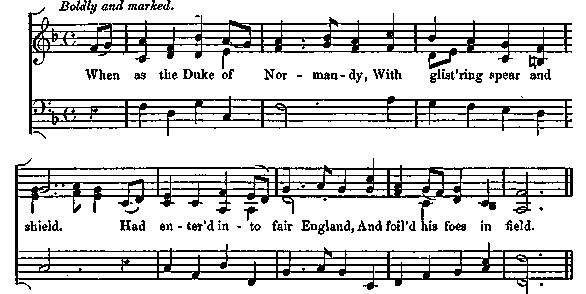Popular Music Of The Olden Time Vol 1
Ancient Songs, Ballads, & Dance Tunes, Sheet Music & Lyrics - online book
| Share page | Visit Us On FB |
|
94 |
ENGLISH SONG AND BALLAD MUSIC. |
|||
|
Rogero is mentioned as a dance tune in Stephen Gosson's School of Abuse, 1579; in Heywood's A woman killed with kindness (acted before 1604) ; and in Nashe's Have iviih you to Saffron- Walden, 1596 ; also by Dekker, in The Shoemaker's Holiday, &c.
Many ballads were sung to the tune of Rogero. In the first volume of the Eoxburghe Collection, for instance, there are at least four.0. Others in the Pepysian Collection; in The Grown Cfarland of Q-olden Moses, 1612; in Deloney's Strange Histories,b 1607 ; in Percy's Reliques of Ancient Poetry ; and in Evans' Old Ballads. Arise and awake is also referred to as a ballad tune.
The following, which is entitled "The valiant courage and policy of the Kentishmen with long tails, whereby they kept their ancient laws and customs, which William the Conqueror sought to take from them"—to the tune of Rogero" is from Strange Histories, &c, 1607. It was written by Deloney, " the ballading silk-weaver," who died in or before 1600. |
||||
|
|
||||
 |
||||
|
|
||||
|
On Christmas-day in solemn sort
Then was he crowned here, By Albert archbishop of York,
With many a noble peer.
Which being done, he changed quite
The customs of this land, And punisht such as daily sought
His statutes to withstand :
• See folios 130, 258, 482, and 492.
11 The Crown Garland and Strange Histories have been reprinted by the Percy Society.
0 Evans, who prints this ballad from another copy (The Garland of Delight) extracts the following account of the event which gave rise to it, from The Lives of .the three Norman Kings of England, hy Sir John Heyward, 4to, 1613, p. 97: "Further, by the counsel of Stigand, Archbishop of Canterbury, and of Eglesine, Abbot of St. Augustine's (who at that time were the chief governors of Kent), as the King was riding towards Dover, at Swanscombe, two miles from Gravesend, the Kentishmen came towards him armed and bearing boughs in their hands, as if it had been |
And many cities he subdued,
Fair London with the rest; But Kent did still withstand his force,
And did his laws detest.
To Dover then he took his way,
The castle down to fling, Which Arviragus builded there,
The noble British king.
a moving wood; they enclosed him upon the sudden, and with a firm countenance, but words well tempered with modesty and respect, they demanded of him the use of their ancient liberties and laws: that in other matters they would yield obedience unto him : that without this they desired not to live. The king was content to strike sail to the storm, and to give them a vain satisfaction for the present; knowing right well that the general customs and laws of the residue of the realm would in short time overflow these particular places. So pledges being given on both sides, they conducted him to Rochester, and yielded up the county of Kent, and the castle of Dover into his power," |
|||